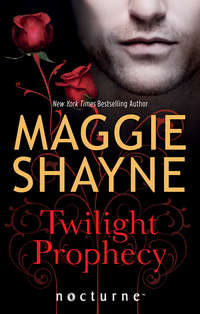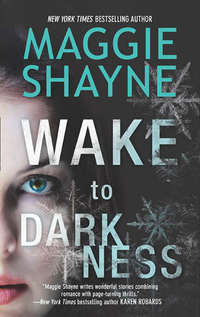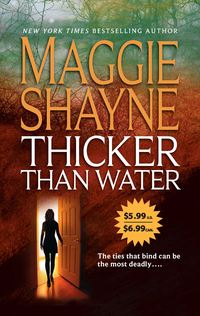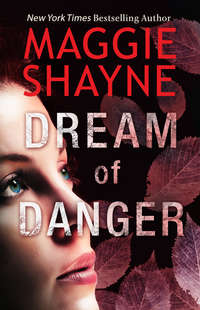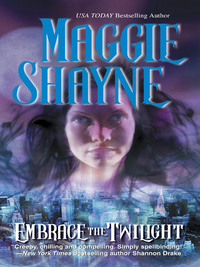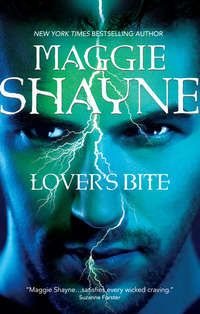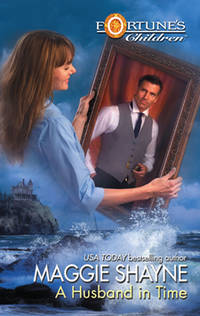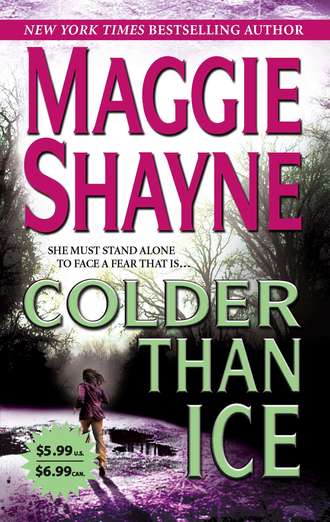
Полная версия
Colder Than Ice

Praise for the novels of
MAGGIE SHAYNE
“A tasty, tension-packed read.”
—Publishers Weekly on Thicker Than Water
“Maggie Shayne demonstrates an absolutely superb touch, blending fantasy and romance into an outstanding reading experience.”
—Romantic Times on Embrace the Twilight
“Maggie Shayne is better than chocolate. She satisfies every wicked craving.”
—Bestselling author Suzanne Forster
“Maggie Shayne delivers sheer delight, and fans new and old of her vampire series can rejoice.”
—Romantic Times on Twilight Hunger
“Shayne’s haunting tale is intricately woven…. A moving mix of high suspense and romance, this haunting Halloween thriller will propel readers to bolt their doors at night!”
—Publishers Weekly on The Gingerbread Man
“Shayne’s talent knows no bounds!”
—Rendezvous
“Maggie Shayne delivers romance with sweeping intensity and bewitching passion.”
—Bestselling author Jayne Ann Krentz
“Shayne’s gift has made her one of the preeminent voices in paranormal romance today!”
—Romantic Times
MAGGIE SHAYNE
COLDER THAN ICE

Contents
Prologue
Chapter One
Chapter Two
Chapter Three
Chapter Four
Chapter Five
Chapter Six
Chapter Seven
Chapter Eight
Chapter Nine
Chapter Ten
Chapter Eleven
Chapter Twelve
Chapter Thirteen
Chapter Fourteen
Chapter Fifteen
Chapter Sixteen
Chapter Seventeen
Chapter Eighteen
Chapter Nineteen
Chapter Twenty
Chapter Twenty-One
Chapter Twenty-Two
Chapter Twenty-Three
Chapter Twenty-Four
Chapter Twenty-Five
Epilogue
Prologue
Arthur Stanton stood in the middle of the narrow, deserted road while the rain poured down on him. In the distance, sirens wailed. Bloodhounds bayed, their unmistakable yowk-yowk-yowks rubbing his nerves raw. Every few seconds a helicopter passed overhead, its searchlight sweeping the ground. Men’s voices rose from far away. Too far away, though. Right now, it was just the two of them: Arthur Stanton and the man in prison grays who’d come stumbling out of the tree line only to stop in his tracks, thirty feet away.
The convict met his eyes; then his glance slid lower, toward the gun Arthur held. He didn’t move, just held his breath, waiting.
Arthur’s hand trembled, not with fear, nor with the symptoms of his age, but with the weight of the decision tearing at his soul. David Quentin Gray, Jr., white-collar criminal and former attorney to a madman, wasn’t the offender Arthur lived to apprehend. But he could be the key to that criminal. If he were free. Imprisoned, he was useless.
Swallowing against the bile that rose in his throat, Arthur lowered his weapon.
The convict frowned at him, jerking convulsively in an almost-lunge, before going motionless again.
He thinks I’ll shoot him in the back if he runs. Hell, maybe I should.
But Arthur didn’t. Instead, he turned and trudged back to his car. It waited on the muddy shoulder, where he’d skidded to a halt when he’d spotted the scarecrow silhouette among the trees, picked out by his headlights as he rounded a curve.
After three steps, Arthur stopped and squeezed his eyes tight. I can’t, I can’t just let him walk. He’s a criminal. I’ve spent the past forty years working against his kind.
He raised his gun as he turned again, unable, unwilling, to do something so contrary to everything he believed.
But David Quentin Gray, Jr. was gone. The decision was made.
Headlights found Arthur, as if to illuminate this newest stain on his soul. Tires skidded, and a car door slammed. It was done. He couldn’t undo it. And now, he thought, the lies begin.
“Stanton? What’s going on? Did you see something?”
Arthur recognized the voice and turned. “Thought I did. It was just a deer, though.”
Assistant Warden Martin Phillips sighed deeply, came closer and clapped a hand to Arthur’s shoulder. “Dammit, I’m sorry. I know what this prisoner meant to you, Stanton.”
“We’ll get him. He can’t get far.”
“Still…” Phillips sighed, looked around just in case, lowered his voice. “You’ll probably have to move her now, right?”
Arthur lifted his head.
“Hell, only a handful of people even know she’s alive,” the assistant warden went on. “Much less where she’s hiding out.”
“You shouldn’t even know.”
“I wouldn’t—if Gray’s cellmate hadn’t been so eager to earn a few brownie points. He was coming up for parole and thought telling me what he knew would help his case.” He grinned. “By running his mouth, all he really did was force us to keep him inside, where he couldn’t spread what he knew about Elizabeth Marcum. Poor stupid shit.”
Arthur reacted instantly, gripping the man by his lapels and drawing him up onto his toes. “She’s dead. As far as the world is concerned, she’s dead. I hear you say her name again, I’ll have to put you someplace where you can’t spread it around.”
“All right, all right. Damn.” Arthur released the man, and Phillips smoothed his lapels. “You act like it’s my fault Gray saw that news clipping of some small-town Blackberry Festival with her in the background. Hell, if it were up to me, they wouldn’t have access to television, newspapers or anything else from the outside.”
Arthur unclenched his fists. He was angry with himself, not Phillips. He’d fucked up. Again.
“So will you move her?” Phillips asked, apparently too stupid to know when to let it drop.
“No.” He’d come this far, Arthur thought. He might as well see this through.
“But—”
“But nothing. You’ve been keeping the prisoner under surveillance since you found out what he knew. Haven’t you?”
“Well, yeah. We’ve watched him like a striptease.”
“And he hasn’t tried to get word out to anyone about the woman’s whereabouts, has he?”
“No. But…all due respect, Arthur, that doesn’t mean he won’t run straight to Mordecai Young now that he’s free.”
I’m counting on it, Arthur thought. But aloud, he only said, “How about you do your own job, Phillips, and let me worry about mine?”
“Jesus, Arthur, if Young finds her, he’ll kill her.”
“I’m not going to let that happen.” He couldn’t let that happen. He couldn’t have the blood of one more innocent staining his hands. He would see to it that Elizabeth Marcum—Beth Slocum, as she was currently known—remained safe. Not by moving her, but by being ready for the madman to strike. And then he could finally catch Mordecai Young and redeem himself. God knew he didn’t have a lot more time to make amends. He was on the far side of sixty, and facing mandatory retirement.
He was using an innocent woman as bait to capture a madman. He knew that. And it was wrong. He knew that, too. He’d had to make a snap decision, and he’d made the wrong one. But it was made. Now he had to follow through. He could make it work out right; he knew he could. The key was in seeing to it that “Beth Slocum” had the best protection he could give her. Someone who would lay down his life before letting any more harm come to the woman.
And he knew there was only one man he could count on to do that.
A man who, like the rest of the world, believed she was dead. A man who had spent the past eighteen years convinced he was the one who had killed her.
Mordecai Young sat in his car with the wipers set on intermittent and the headlights turned off. An observer, had there been one, would have said he was alone in the car, yet Mordecai was never truly alone. He waited right where he had said he would. He could wait all night. But he wouldn’t have to. He had it on pretty good authority that his old friend and former attorney, David Quentin Gray, Jr., would make it here unscathed.
It would be good to see David again. It had been a long time.
He really had picked the perfect spot—or rather, his guides had: a pull-off near a railroad crossing where no trains ran anymore. Back roads, no one around.
Oh, there would be roadblocks, but that didn’t matter. He didn’t know why yet, but he knew they were not going to be a problem. He knew it with a certainty that told him it was “given” knowledge. It came from beyond him.
Mordecai sat a little straighter in his seat when he spotted the man, hunched and shivering, near the edge of the woods. Gray was peering through the rain at the car, as if too wary to come any closer. Smiling to himself, Mordecai flashed his headlights on, then off, then on again. He left them on, because he couldn’t believe his one-time attorney looked the way he did. Prison had apparently forced him to overcome his obsession with Italian suits and flawless grooming. David could have passed for a scrawny, half-drowned alley cat.
When he drew closer, Mordecai reached across the car and opened the passenger door.
David peered in at him, his face drawn and pinched, even when he smiled—a smile that never reached his eyes. “Mordecai. Damn, it’s good to see you.” He started to get in.
“Wait.” Mordecai reached into the back seat for the red flannel blanket that lay folded there, pulled it into the front and draped it as best he could over the upholstery. “You’re a mess, David. What did you do? Crawl out through the prison sewers?”
David scowled at him but got in. As soon as he’d closed the door, he pulled the loose ends of the blanket around him. “I’m frozen half to death.”
“No wonder. You’re skin and bone. You don’t look well, David.”
“Prison will do that to you.” He glanced at Mordecai. “You look good, though. You never change.”
It was true. Mordecai hadn’t changed. His head was still clean shaven, his eyes still his most distinctive feature. He would have to change, though, once he found out where Lizzie was hiding. It wouldn’t do to have her recognize him too soon.
He started the engine and turned up the heat. “I was glad to receive your letter, David. I have to say, it surprised me.”
“It should have,” David said, using a corner of the blanket to wipe the rain water from his face. “They’ve been watching everything I do—listening in on every conversation, every phone call, reading my mail both coming and going. My own fault, blabbing to my cellmate about what I knew. I know the little bastard ratted me out.”
“It wasn’t smart to tell him anything. It’s never smart to give away too much. You taught me that yourself.”
David frowned, but didn’t ask what Mordecai meant by that. Maybe because he knew where the conversation was going. Or maybe the reference to his disloyalty of a year ago had sailed right over his head.
“I had to smuggle your letter out with another prisoner on work release.”
“I didn’t mean I was surprised you could get a letter out. What I meant, David, was that I was surprised your loyalty to me had lasted so long.” He tipped his head slightly.
Bull. He wanted you to get him out of prison, and that’s the only reason he told you a damn thing.
Don’t trust him. He could be trying to trick you, the way she did.
Ask him where she is. Stop wasting time!
Mordecai closed his eyes briefly, slowly. The voices had multiplied. Where there used to be one or two, there were now too many to count. Though it had occurred to him that there were likely twelve. That would make the most sense, wouldn’t it? Twelve.
And perhaps, he thought, one of them might be his Judas.
He didn’t know them all. Some were more accurate than others, and he’d been struggling to learn which ones he should heed and which he would do better to ignore, or whether it was the flaw of his own human condition that twisted their messages so that they were not always quite right—a far more likely possibility. The voices came from Spirit. Spirit couldn’t be wrong. His guides had taught him many things over the years. A deeper understanding of scripture. The importance of faith without question. The intricacies of poisons, and everything there was to know about explosives. The true depth of his twofold mission: to bring Lizzie to her knees, and to find his rightful heir.
He lifted his chin, tried to will the voices to be quiet. They chose to obey this time. They didn’t always.
“I’d still like to know how you managed to get me out,” David said. “I know some of the guards had to look the other way, let it happen.”
Mordecai smiled softly. “It wasn’t hard. My guides told me which guards would be open to bribery. Most men have their price, David.”
David lowered his eyes. “Still with the voices, huh?”
“Of course. They’re spirit guides. They don’t just go away.”
He could tell David would have liked to argue with that, but he had the good sense not to.
“So how are you going to get us out of here without being caught? Did your guides tell you that?”
“They will, when the time comes. But first, David, you have to keep your promise. Tell me what you know about my Lizzie. Where is she hiding?”
David licked his lips, looked out the rain-streaked windows into the darkness. Then he shook his head. “Not here. It’s not safe, sitting here like this. How about you get me out of here, past the roadblocks and shit first? Then I’ll fulfill my end of the bargain.”
Mordecai didn’t like that.
He’s an ungrateful bastard, this one.
Put him in the trunk!
Mordecai nodded, rubbing his forehead a little. “All right. You’re going to have to ride in the trunk, David. In case they do stop us.”
“The trunk?” David looked horrified at the thought.
The man’s soaking wet and frozen to the bone. Have mercy for God’s sake.
God, how he hated it, Mordecai thought, when the voices disagreed.
He was your friend once.
That much was true. David had been his friend. Once. “Just get in the back, then. Lie on the floor and keep yourself hidden under the blanket. All right?”
David nodded, smiling a little. “Thanks, Mordecai.” Then he climbed into the back seat and curled up on the floor, a skinny, wet blanket-bundle.
Mordecai drove the car. He drove where the voices told him to drive, even though he didn’t understand why. Faith, he reminded himself, wasn’t about understanding why. It was about believing, about acting without hesitation to obey the dictates of Spirit. He drove for ten minutes, then twenty. And then he pulled off and stopped the car.
He leaned over the back seat. “We’re clear, David. All clear.”
“God, you didn’t even get stopped,” David said, pulling the blanket from over his head and staring up at Mordecai from the floor. “Are you sure?”
“I’m sure. You know how ineffective the police can be.”
David smiled and started to get up.
“Wait,” Mordecai said. “I’ve been very patient with you, David. Very patient. But my patience is wearing thin. Tell me what you know about Lizzie.”
David was sitting up now, but still on the floor. He nodded, sighing. “There was this picture in the newspaper, some kind of festival, late last fall. She was in the background of the shot, standing in the crowd watching a parade go by.” He shook his head. “I couldn’t believe the coincidence.”
“Oh, it was no coincidence. It was the hand of Spirit. You were meant to see that photo, and I was meant to find my Lizzie.”
David nodded, licking his lips and looking a little nervous. “The town was some rural place in Vermont. Blackberry.”
“Blackberry, Vermont. God, it’s almost too quaint.” He pictured her, the way she had been, long ago. Lost and alone, and so very needy. He’d been her hero, her savior, then. “I presume she’s using an alias.”
“I don’t know. I would imagine so. The government probably set her up with a whole new identity after—after what happened last year.” He shook his head. “I can’t believe she actually shot you. If it wasn’t for that vest—”
“We don’t discuss that, David.”
David’s eyes shot to Mordecai’s, then lowered. “All right.”
“That’s all you know? You’ve told me everything?”
He nodded. “That’s all. I don’t know if she’s living in that town or was only there visiting. But I know it was her. I’m sure it was her. I saved the clipping for you.” He dug into a pocket as he spoke, tugged out a folded scrap of paper and held it up.
Mordecai took it. It was damp and worn. He unfolded it carefully, then turned on the overhead light so he could see it. The headline read “Harvest Time in Smalltown, USA.” The photo was three columns wide, and in color. Floats with giant pumpkins and small children. A high school marching band. A crowd of spectators. A backdrop of crimson and gold foliage. Despite the wet blotches and creased folds, Mordecai spotted her right away. She stood in the crowd, and yet alone. She wore blue jeans and a suede jacket. Her long blond hair was pulled back in a ponytail. He was irrationally glad she hadn’t cut it.
“You’re right,” he said to David. “It’s her. It’s Lizzie.”
“I knew it. Anyway, the article doesn’t say anything about her. But it’s something. It’s more than you had before.”
Mordecai nodded. “Then I guess I’m finished with you now. You can get out.”
Blinking, frowning in confusion, David said, “You…want me to just…go? You’re just going to leave me out here like a stray dog? Mordecai, I need a place to crash, some dry clothes, maybe a few dollars in my pocket. I’ve got to survive. After what I’ve done for you, I thought—”
Mordecai sighed. “You’re right. I mustn’t forget what I owe you, after all. I’m going to take care of you, David, the way you took care of me. Come on, get up now. Come with me.”
Mordecai opened his door and got out; then he opened the back door and took David’s arm to help him out of the car. “You have taken good care of me, after all, haven’t you, David?”
“I knew you’d want to know.”
“Oh, I don’t mean this,” Mordecai said, shoving the clipping into his pocket. “This…this was good, David, but we both know it was self-serving. You did this for yourself, not for me.”
“No—”
“Yes. You wanted me to get you out of prison. You knew this information would ensure I did so. After all, you could have just enclosed the clipping with the letter.”
David broke the hold of Mordecai’s eyes to look around. He was getting very nervous. “I could have. But I didn’t want to risk losing it. It could have been found.”
Mordecai shrugged. “And what about last year, when you told them where to find me after I’d reclaimed my daughter from that bitch Julie Jones? Was that all for me, as well?”
David’s gaze snapped back to Mordecai’s. “I didn’t—”
“David, David, don’t lie to me. I know it was you. You were the only one, besides Lizzie and I, who knew about the mansion in Virginia. And even if you weren’t, my guides told me who played Judas to my Christ.”
“Jesus, the guides again. Mordecai, you can’t always trust those voices in your head. They aren’t—”
“Aren’t what? Aren’t real? How have I survived, then? I could have been killed at the raid on my compound eighteen years ago. I could have been killed in Virginia last year, when the woman who claimed to love me fired a bullet into my chest. Or later, when the police descended on me. But I wasn’t. My daughter could have been killed, as well, by those bastards claiming to have come to rescue her. From her own father. They called it a kidnapping. Can you imagine?” He shook his head. “I survived. I always survive. The guides see to that. And they tell me all I need to know. Admit it, David. You betrayed me.”
David blinked. He was shaking again, but not from the cold this time. “You’re right, I did tell someone about the Virginia house. Not the authorities. Another prisoner. I had no choice in that, Mordecai. He had clout, a lot of respect. You don’t know what it’s like in prison. They would have killed me if I hadn’t talked.”
“So again, your self-interests outweighed your concern for me.” Mordecai shrugged. “I suppose it’s part of the human condition. Selfishness. Disloyalty.”
David couldn’t hold his eyes, so he looked past him. And then the worry returned. “Mordecai, this looks like the same place where you picked me up. Isn’t this right where we started?”
“Right where you started, perhaps. I’m miles ahead of where I was a short while ago. Goodbye, David.”
Mordecai lifted the gun, as the voices had been screaming at him to do for countless minutes now. It had come to him very clearly why the roadblocks would not be a problem tonight. It was because David wouldn’t be cowering in the back seat when Mordecai’s car was searched. David wasn’t going anywhere—nowhere on this plane, at least. He pointed the gun’s barrel at David’s head, and even as the man flinched and cried out, Mordecai calmly squeezed the trigger.
David’s body collapsed downward like a building when well-placed demolition charges go off. He sank fast, landing in a heap at Mordecai’s feet.
“I promised to free you from your prison, David. And now I have.”
Mordecai left the blanket where it was, twisted around David’s body. It was wet, muddy now, and tainted with blood. He got back into the car, sliding the gun into the holder he had mounted under the driver’s seat, and drove away.
It was time to find Lizzie. It was time to right the wrongs she had done, wash clean the sins she had committed—against him, against their daughter.
Against God.
Chapter One
Thursday
Elizabeth Marcum was running again.
She was always running, it seemed.
One after the other, her powder-blue Nike cross trainers hit the winding road’s soft shoulder, her steps cushioned by a thick, fragrant carpet of leaves. She sucked in the aroma of them with every harsh breath she drew. Sugar maples lined the roadsides, arching overhead like a vivid circus canopy of scarlet and purple and pumpkin orange. It crossed her mind that she loved it here, but she brushed the thought aside. There were a hundred other small towns with country lanes and breathtaking foliage where she could be just as comfortable. Comfort wasn’t love. She could take Blackberry, Vermont, or leave it.
She hit the three-mile mark just as she rounded the curve that brought the old Bickham place into view. The once stately Victorian’s white paint was peeling. A few of the black shutters were crooked, others missing, like neglected teeth in an old man’s mouth. On the porch, Maude waved from her wicker rocking chair. Elizabeth slowed to a walk, her heart rate slowing naturally as she veered off the road and onto the overgrown flagstone path. She preferred it to the driveway, despite its cracks and weeds. The sidewalk started at the tilting signpost, with its weather-worn sign and fading letters—you could hardly make out “The Blackberry Inn” anymore—and wound its way to the porch, forking off in one spot to twist around the old house to what had once been a garden in the back.
At the bottom of the porch steps, Beth leaned over, braced her hands on her knees and took a few breaths.
“Gettin’ older, girl,” Maude called. “You might better walk, like you used to.”
Beth smiled. Every day, Maude began their morning visit with the same remarks. When Beth had first come here—God, had it really been a year ago?—she had started this ritual with a daily walk. It had scared the hell out of her to even leave her house, but that daily walk had been an act of defiance, a way of thumbing her nose at her own fears. It had evolved into a run.



